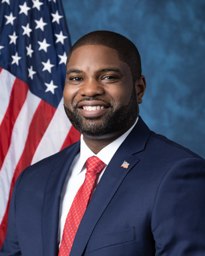Notable Numbers (So Far) from the 118th Congress Speaker Balloting
Jeffries and Donalds set new records for their states
 As the political drama continues to unfold in Washington, D.C. in voting for the Speaker of the U.S. House for the 118th Congress, some interesting milestones have been recorded through the fifth round of balloting.
As the political drama continues to unfold in Washington, D.C. in voting for the Speaker of the U.S. House for the 118th Congress, some interesting milestones have been recorded through the fifth round of balloting.
Thus far, two individuals have received a record number of Speaker votes for their respective states.
On Tuesday, the unanimous Democratic caucus support of 212 votes for Representative Hakeem Jeffries is the largest raw number of roll call votes won by a resident of the state of New York.
Jeffries eclipsed the 207 votes won by Republican Bertrand Snell in 1931 as Texas Democrat John Nance Garner was elected to the post.
Jeffries had previously received one vote for the 117th Congress speakership. Former GOP U.S. Representative Lee Zeldin received one vote in the 1st round of balloting on Tuesday, making him the 45th New Yorker to receive a vote for Speaker in the chamber’s history.
On Wednesday, the Republican caucus dissidents threw their support behind Florida’s Byron Donalds (pictured).
Donalds won 20 votes on the 4th and 5th ballots which also broke his state’s record.
In 2015, Republican Dan Webster won 12 votes as Ohio’s John Boehner won the speakership for a third straight congress.
Donalds is the eighth Floridian to receive votes for the position in state history.
It should also be noted that the single vote for Republican Jim Banks on Tuesday’s 1st ballot was the first vote for an Indiana resident in more than half a century. In 1963, Republican Charles Halleck won 175 votes as Massachusetts Democrat John McCormack was reelected Speaker.
Likewise, the 10 votes cast for 1st ballot nominee Andy Biggs was the most for an Arizonan since 1979 when GOPer John Rhodes recorded 152 votes placing second to Massachusetts Democrat Tip O’Neill.
Nine states have yet to see one of their own receive a single vote for House Speaker over the decades: Alaska, Hawaii, Montana, New Mexico, North Dakota, South Dakota, Utah, West Virginia, and Wyoming.
Nearly half of the states (24) have had at least one resident receive votes for Speaker since the turn of the century: Missouri (2001), Pennsylvania (2005), Maryland (2011), North Carolina (2011), Idaho (2013), Michigan (2013), Virginia (2013), Alabama (2015), Georgia (2015), Oregon (2015), South Carolina (2015), Texas (2015), Tennessee (2017), Wisconsin (2017), Delaware (2019), Kentucky (2019), Massachusetts (2019), Illinois (2021), Arizona (2023), California (2023), Florida (2023), Indiana (2023), New York (2023), and Ohio (2023).
Ten states last saw a resident receive votes in the 19th Century: Connecticut (1856), New Hampshire (1856), Rhode Island (1856), Vermont (1856), Arkansas (1860), Louisiana (1860), New Jersey (1860), Maine (1897), Colorado (1899), and Nevada (1899).
Seven states have been waiting since the 1900s: Mississippi (1907, Democrat John Sharp Williams), Nebraska (1911, Republican George Norris), Minnesota (1933, Farmer-Laborite Paul Kvale), Kansas (1935, Republican W.P. Lambertson), Oklahoma (1975, Democrat Carl Albert), Washington (1993, Democrat Tom Foley), and Iowa (1997, Republican Jim Leach).
Follow Smart Politics on Twitter.

So far, no resident from the Peace Garden State has ever received any vote for House speaker, delegate vote for president at a national convention of a major party, or produced active contender for either office? (For the record, North Dakota is not even THE least populous state!)
It is worth noting that, since the speaker of the House and the president pro tempore of the Senate have been placed back in the line of presidential succession in 1947, two Senate “pro tems” have been moved up to SECOND due to vacancies in the House speaker position. First is AZ Democrat Carl Trumbull Hayden, from 16 of 11/1961 to 10 of 01/1962 (death of “Sam” Rayburn). The second is WA Democrat Patricia Lynn Johns “Patty” Murray, from 03 of 01/2023 to ??
Update: “Patty” Murray has been 2nd in line from 03 of 01/2023 to 07 of 01/2023.
With the belated win by Kevin McCarthy, both the president of the US Senate (aka, vice president) and the speaker of the US House will hail from the same state but from different political parties. Prior to this year, when did that occur?
Before today, the most recent instance was 1987-89, when Texans George H. W. Bush (R) and Jim Wright (D) served as president of the Senate and speaker of the House, respectively.
The complete list of times where both officers hailed from the same state is:
*1820-21, New York: Daniel D. Tompkins (DR), John W. Taylor (DR)
*1921-23, Massachusetts: Calvin Coolidge (R), Frederick H. Gillett (R)
*1940-41, Texas: John Nance Garner (D) [who himself served as speaker 1931-33], Sam Rayburn (D)
*1961, Texas: Lyndon B. Johnson (D), Sam Rayburn (D)
*1987-89, Texas: George H. W. Bush (R), Jim Wright (D)
*2021-23, California: Kamala Harris (D), Nancy Pelosi (D)
*2023-present, California: Kamala Harris (D), Kevin McCarthy (R)
As can be seen, until today Bush Sr./Wright in 1987 was the first and only occurrence where the two chambers’ top officials were from the same state but different parties.
Also, Sam Rayburn is the only speaker to serve with two same-state vice presidents, while Kamala Harris is the only vice president to serve with two same-state speakers.
An interesting query – thanks for the quick answer, John!